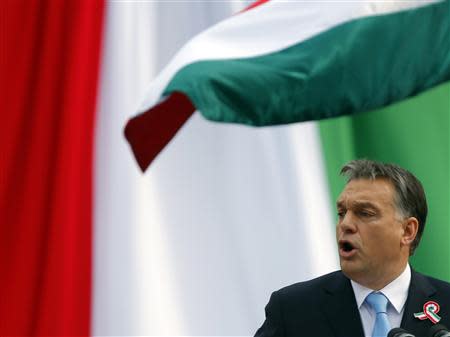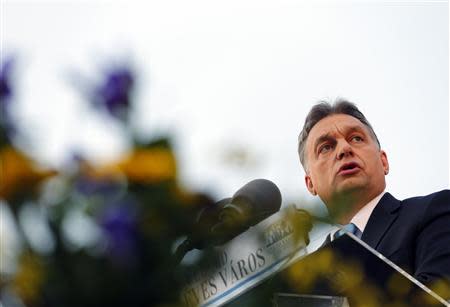Hungary to ignore critics with landslide for Orban
By Gergely Szakacs and Christian Lowe BATONYTERENYE, Hungary (Reuters) - Barring a major upset, Hungarians will enthusiastically re-elect Prime Minister Viktor Orban and his Fidesz party for another term in April. To outsiders who see an authoritarian troublemaker, the expected landslide looks odd. Not to those who know what motivates him. When Orban first became prime minister in 1998, aged 35, he stripped his office and replaced the fittings with items used by his pre-war predecessors, scavenged from elsewhere in the building, former spokesman Gabor Borokai told Reuters. The aim was to re-connect with one of the brief periods in Hungary's history when it was proud and independent, a key theme in his popularity, which appears undented by external criticism. Over the past four years, the United States and European Union have accused Orban of eroding Hungary's democratic checks and balances and of harming free speech. Jewish groups have accused him of not doing enough to tackle anti-Semitism. The International Monetary Fund, for a time, said he was risking financial stability. Some of the biggest foreign investors accuse him of waging a witch-hunt against them. The Hungarian government rejects all those allegations. Orban, like other emerging market leaders who unsettle the outside world yet are popular at home - such as Turkish Prime Minister Tayyip Erdogan, or, in earlier days, South African President Jacob Zuma - connects with the national psyche. Orban knows that many Hungarians believe their country is not like the rest of Europe, and suspect the world has an axe to grind against them. "There's a feeling that the Hungarians are misunderstood. It's part of their history," said one EU diplomat. "He knows how to play on the vibe here." CHEQUERED HISTORY It is a chequered history that feeds that exceptionalism. Hungarians' ancestors originated in what is now central Russia, and migrated to the banks of the Danube around the ninth century. As a result, they are ethnically different from their Slavic and Teutonic neighbours. The nearest cousins to their language are in Finland, and in Russia's Ural mountains. Once settled, their land was occupied first by the Ottomans, then the Habsburgs. On the losing side in World War One, Hungary lost two-thirds of its territory. In World War Two, it fell into the orbit of Nazi Germany, and then was occupied by Soviet Union troops, to become a communist satellite until the fall of the Iron Curtain. From 1989, Hungary embraced capitalism and the European Union, but many remained suspicious of the international financial order and the liberal moral values of western Europe. Orban summed up the sentiment in the northeastern city of Miskolc on March 12, where he was laying the foundation stone for an airbag factory at a campaign stop on his bid for a second continuous term, and a third in total. "We are a unique people here in Europe," he said in a speech on the construction site. "We do not have too many friends." A day earlier, Orban was at the site of a planned furniture factory near Batonyterenye, 100 kilometres (60 miles) east of the capital, Budapest. While a company executive delivered a speech, Orban stood to the side, out of shot of the television cameras. He fidgeted, adjusted his tie, and whispered jokey asides to local officials. Then a young Hungarian folk ensemble in traditional dress began singing. Orban stopped fidgeting, took a step forward and stood as if transfixed, beaming. COMMON TOUCH Asked for the secret of Orban's success, his chief of staff Janos Lazar told Reuters: "At the end of the day, it is not what you say but what you are like that matters in politics. After 25 years, he is popular in the 'what you are like' category." The former leader of Britain's Liberal Party, David Steel, who invited him to his home in Scotland for a gathering of liberal politicians in 1992, described Orban, then only 29 and a founding member of Fidesz four years earlier, as "a man of considerable ability and agility ... obviously an outstanding individual". But not too grand to sleep on Steel's sofa when all the beds were taken by other guests. He and Fidesz have parted company with their liberal beginnings, but that common touch kept him connected with ordinary Hungarians, and their need to feel proud of their identity. In power, he had the "Holy Crown" worn for centuries by Hungarian kings moved from a museum to parliament, where it is watched over by sentries in starched uniforms. He has relished conflicts, accusing foreign banks of trying to exploit ordinary people and ratcheting up a spat with Germany's Angela Merkel by mentioning how Nazi Germany sent tanks into Hungary. He fought a war of words with the IMF, during which billboards went up around Budapest saying Hungary would not give in to the Fund's dictates. He said "troops of bureaucrats" from Brussels were attacking Hungarian sovereignty. All that plays well with many voters, no matter how badly it is taken abroad. Outside a convenience store in Gyongyos, a farming town surrounded by vineyards, people talk of how Orban fixed the financial mess inherited from his Socialist predecessor, and how he brought down energy bills. A recurring theme is his frankness in defence of Hungary's interests. "He stands up and says whether he likes something or not," said Zoltan Szerencses, 29, an accountant. "He does not care much whether the EU likes something or not. And I like this, that he dares to express his opinion to the outside world, not just at home." Gabriella Toth, 53, looks after her disabled husband and lives in Gyongyos on state handouts. "He defends the Hungarian people and the country," she said of Orban. "He is not a marionette of the EU, and I think that is a good thing." Few doubt that Orban's views are sincerely held, but people who know him say there is calculation, too. Miklos Haraszti, who in the 1980s acted as a mentor to young anti-Communist dissidents, including Orban, said he taught the young man how to use conflict as a political tactic. "At the start, his ability to kick up conflict was a tool for moving good things ahead," said Haraszti, now an Orban critic who says these days it is just political posturing. Diplomats say Orban is pragmatic about the fights he picks. They say he stays just the right side of a line that, if crossed, would bring major financial and economic consequences. For all his verbal attacks on Brussels, as he toured the country this month, his black Volkswagen van sped along roads that were part-financed by EU money. Orban did not respond to requests for an interview. Government spokesman Ferenc Kumin said Orban was successful in defending Hungary's national interests, "and likely this is reflected in his massive support", but that Hungary was a normal EU member with an average number of conflicts with Brussels. The main reason voters backed the ruling party, he said, was the improving economy, with independent surveys showing consumer confidence and business confidence rising. (Additional reporting by Marton Dunai; Editing by Will Waterman)


